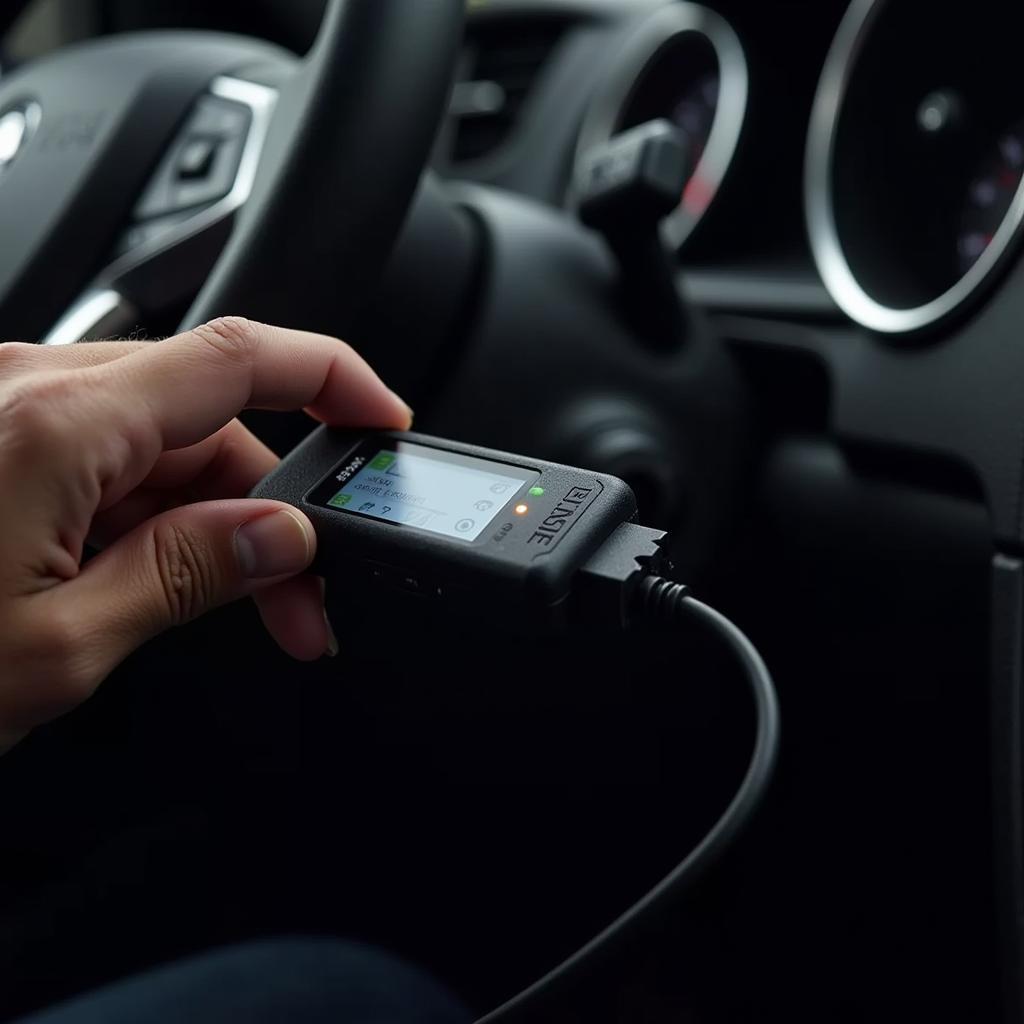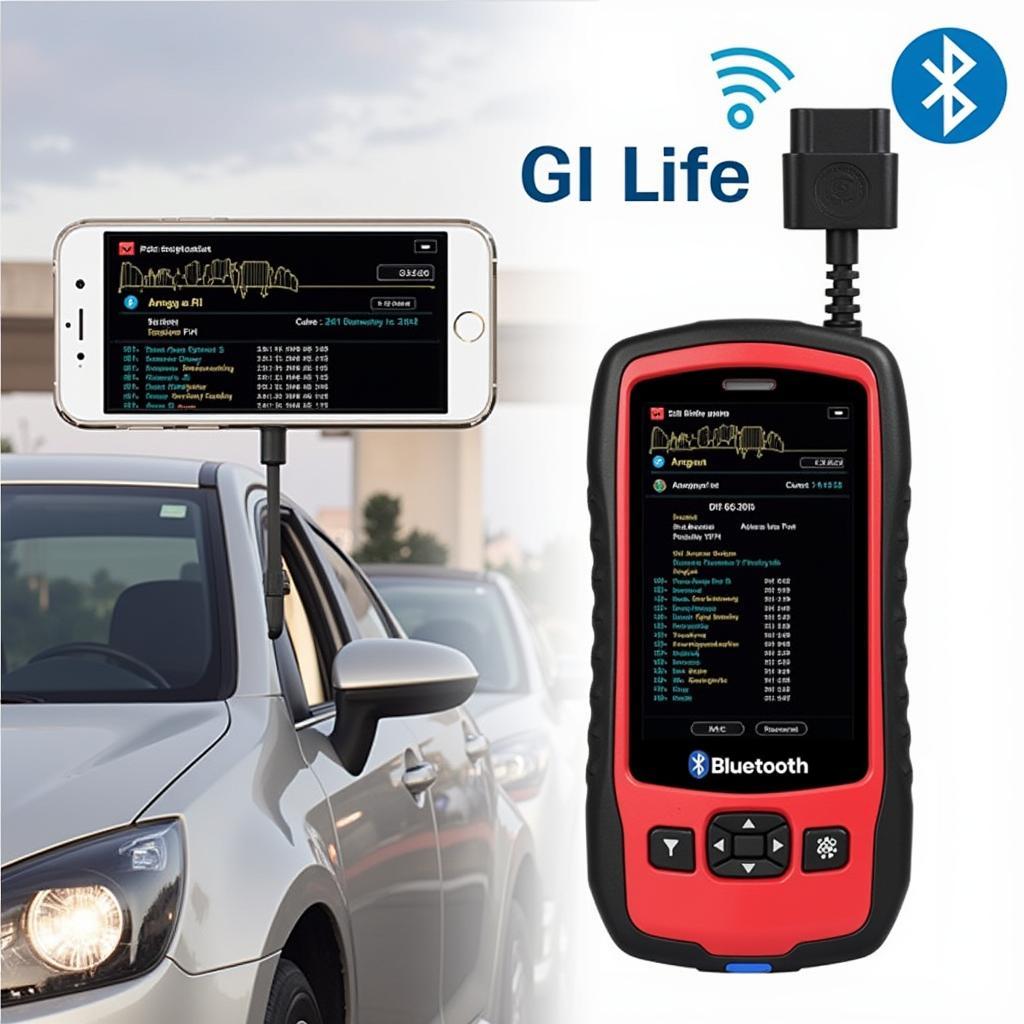In the realm of automotive repair and maintenance, having the right tools can make all the difference. And when it comes to diagnosing and troubleshooting modern vehicles, Otc Scan Tools stand as essential equipment for both professional mechanics and car enthusiasts alike. Gone are the days of relying solely on basic code readers; OTC scan tools offer a comprehensive suite of features that empower users to delve deeper into a vehicle’s systems, unraveling complex issues with precision.
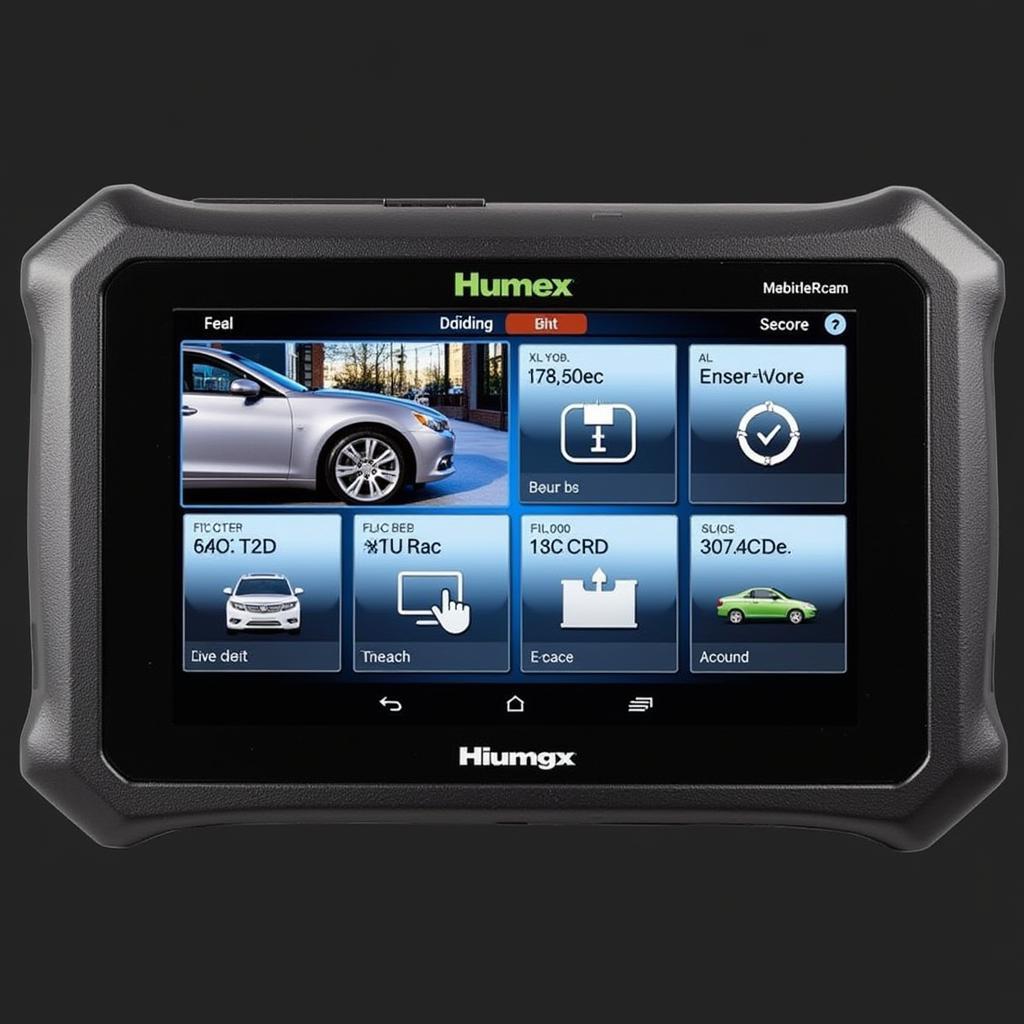 OTC scan tool displaying various diagnostic features
OTC scan tool displaying various diagnostic features
Understanding OTC Scan Tools: More Than Just Code Readers
OTC, short for Owatonna Tool Company, has established itself as a trusted name in the automotive tool industry for over a century. Their scan tools are renowned for their reliability, accuracy, and user-friendly design, catering to a wide range of users from seasoned professionals to DIY enthusiasts. But what exactly are OTC scan tools, and how do they differ from basic code readers?
While basic code readers can retrieve and clear simple diagnostic trouble codes (DTCs), OTC scan tools go several steps further. These advanced tools can access multiple vehicle systems, providing live data streams, bi-directional controls, and special functions that enable users to:
- Diagnose and troubleshoot complex engine, transmission, ABS, airbag, and other system-related issues.
- Read and clear manufacturer-specific DTCs for more accurate diagnosis.
- Perform active tests, such as actuating solenoids, relays, and other components.
- Conduct adaptations and calibrations for various vehicle modules.
- Access and record live data parameters to monitor sensor readings, actuator performance, and system behavior.
- Generate and save diagnostic reports for future reference.
Choosing the Right OTC Scan Tool: A Tailored Approach
The world of OTC scan tools offers a diverse range of options, each catering to specific needs and budgets. From entry-level models designed for DIYers to professional-grade devices packed with advanced features, selecting the right tool depends on several factors:
1. Vehicle Coverage:
- DIY users: Opt for a tool that covers a wide range of vehicle makes and models, especially if you work on multiple vehicles.
- Professional mechanics: Consider tools that offer comprehensive coverage for domestic, Asian, and European vehicles, including light-duty trucks.
2. Diagnostic Capabilities:
- Basic needs: Choose a tool that can read and clear DTCs, display live data, and perform basic functions like ABS bleeding.
- Advanced diagnostics: Opt for a tool that offers bi-directional controls, special functions, coding/programming capabilities, and access to manufacturer-specific data.
3. Budget:
- Entry-level: Consider tools like the otc obd11 scan tool, which provide essential diagnostic functions at an affordable price point.
- Mid-range: Look for tools that offer a balance between price and features, typically including more advanced functions like active tests and adaptations.
- High-end: Invest in professional-grade tools like the otc genisys touch scan tool, which provide comprehensive coverage, advanced features, and regular software updates.
4. User Interface:
- Intuitive design: Choose a tool with a user-friendly interface, clear menus, and easy-to-navigate screens.
- Touchscreen or button-based: Select a tool based on your preference for interaction and ease of use.
5. Software Updates:
- Regular updates: Ensure the tool you choose offers regular software updates to maintain compatibility with the latest vehicle models and diagnostic protocols.
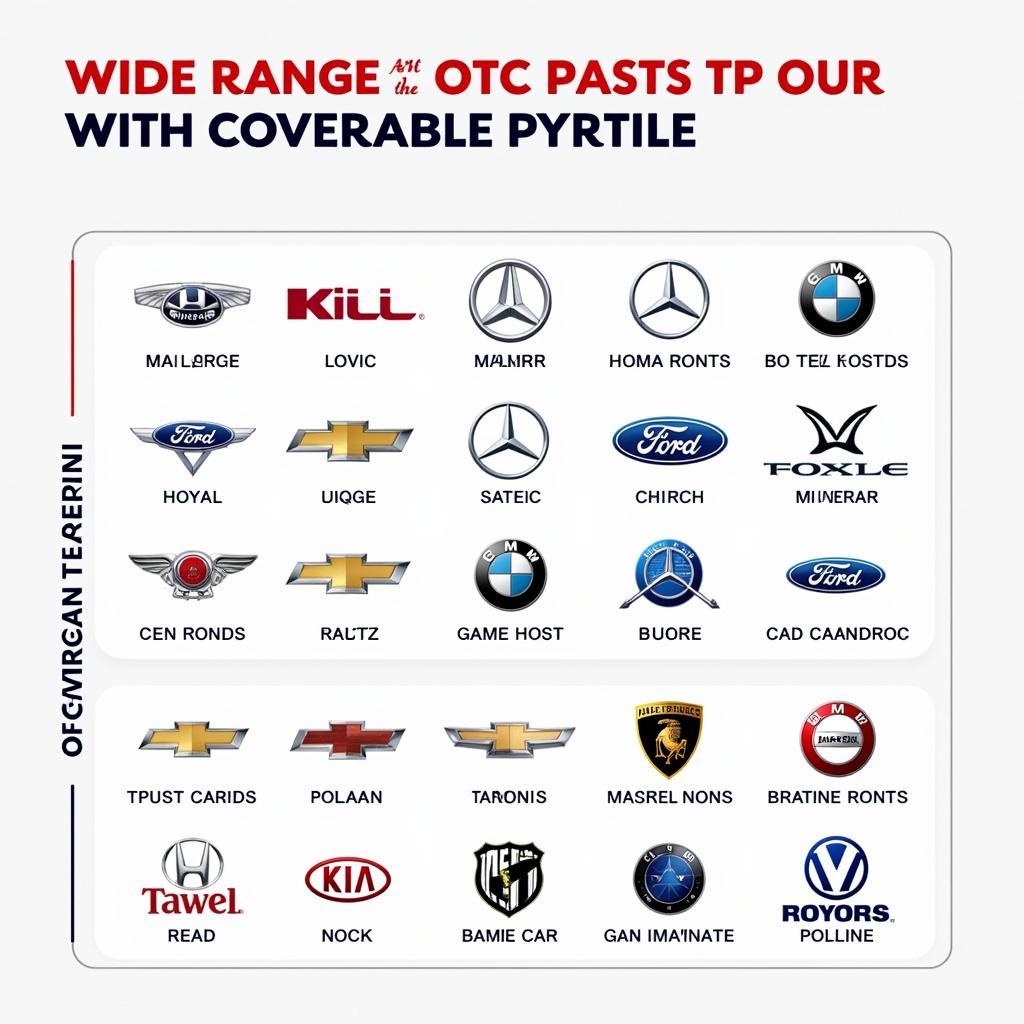 OTC scan tool compatibility chart for different car makes
OTC scan tool compatibility chart for different car makes
Maximizing the Power of Your OTC Scan Tool: Tips and Tricks
Owning an OTC scan tool is just the first step; mastering its capabilities unlocks its true potential. Here are some tips to help you get the most out of your investment:
- Read the Manual: It might seem obvious, but thoroughly understanding your specific tool’s features and functions is crucial for effective use.
- Familiarize Yourself with Vehicle Systems: Having a basic understanding of how different vehicle systems work will enhance your diagnostic capabilities.
- Utilize Live Data: Don’t just rely on DTCs; analyzing live data streams provides valuable insights into sensor readings, component performance, and system behavior.
- Document Your Findings: Keep a record of DTCs, freeze frame data, live data readings, and any steps taken during the diagnostic process.
- Stay Updated: Regularly update your scan tool’s software to access the latest features, vehicle coverage, and bug fixes.
OTC Scan Tools: Beyond Diagnostics
While OTC scan tools excel in diagnostics, their capabilities extend beyond troubleshooting.
- Preventative Maintenance: Use your OTC scan tool to monitor vital system parameters and identify potential issues before they escalate into major problems.
- DIY Repairs: Empower yourself to tackle more complex repairs, such as [can a scan tool detect a bad catalytic converter](https://carw.store/can-a-scan tool-detect-a-bad-catalytic-converter/), with the aid of your scan tool’s guidance.
- Performance Tuning: Some OTC scan tools offer features that allow users to adjust certain vehicle parameters for optimized performance.
OTC Scan Tools: An Investment in Automotive Expertise
In the ever-evolving landscape of automotive technology, OTC scan tools have become indispensable assets. Whether you’re a seasoned mechanic, a passionate DIYer, or a fleet owner looking to streamline maintenance, these tools provide the knowledge and control needed to navigate the complexities of modern vehicles. By investing in the right OTC scan tool and honing your diagnostic skills, you’ll be well-equipped to tackle automotive challenges head-on, ensuring optimal vehicle performance and longevity.
Need help choosing the right OTC scan tool for your needs?
Contact CARW Workshop at +1 (641) 206-8880 or visit our office at 4 Villa Wy, Shoshoni, Wyoming, United States. Our team of experts can guide you through the selection process and provide tailored recommendations based on your requirements.
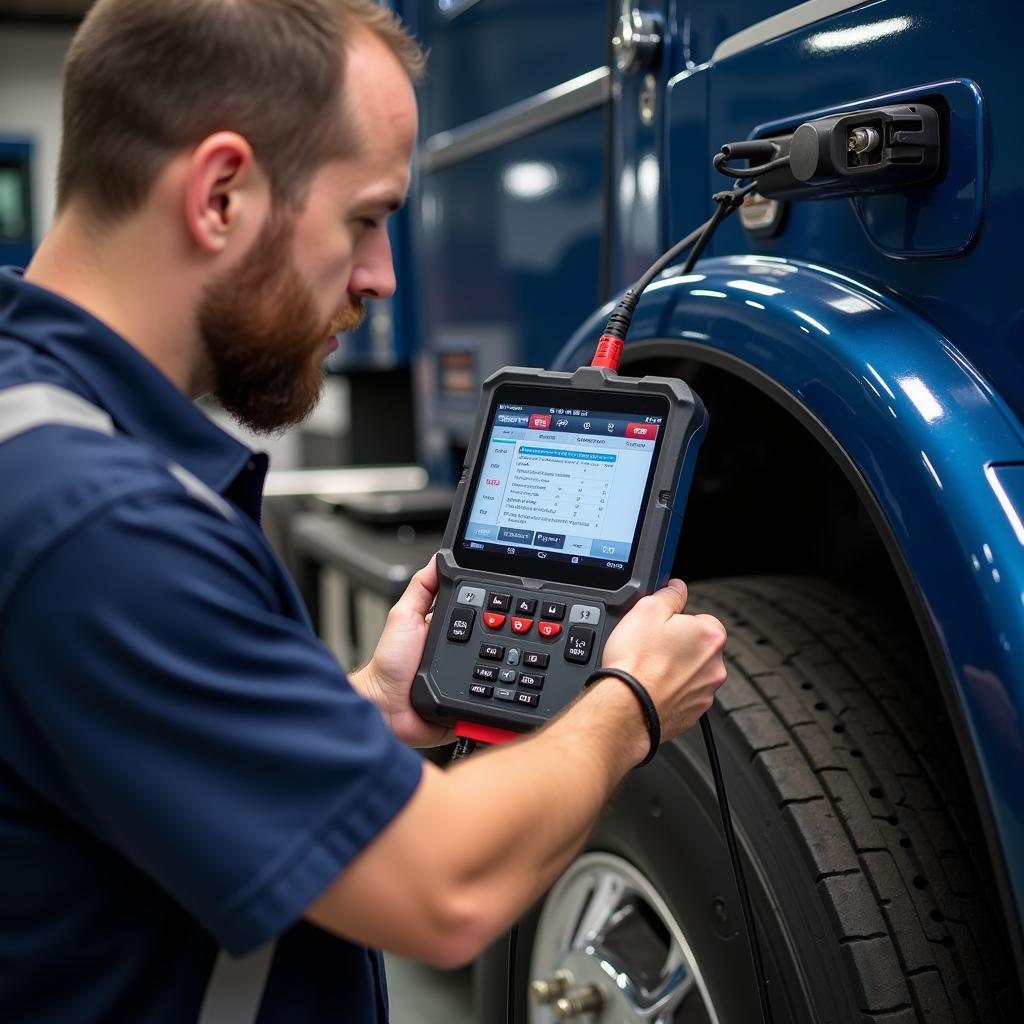 Mechanic using an OTC scan tool to diagnose a heavy-duty truck
Mechanic using an OTC scan tool to diagnose a heavy-duty truck
FAQs about OTC Scan Tools
1. Can I use an OTC scan tool on any vehicle?
OTC scan tools offer a wide range of vehicle coverage, but it’s essential to check the tool’s specifications to ensure compatibility with the specific make, model, and year of your vehicle.
2. What is the difference between an OTC scan tool and a code reader?
While code readers can only retrieve and clear basic DTCs, OTC scan tools provide advanced features like live data streaming, bi-directional controls, special functions, and access to manufacturer-specific data.
3. Do I need to be a mechanic to use an OTC scan tool?
OTC scan tools are designed to be user-friendly, with intuitive interfaces and clear menus. While basic mechanical knowledge is helpful, many tools are accessible to DIY enthusiasts as well.
4. How often do I need to update my OTC scan tool’s software?
Regular software updates are crucial for maintaining compatibility with the latest vehicle models and diagnostic protocols. It’s recommended to check for updates at least every few months.
5. Can I use an OTC scan tool to program keys or modules?
Some OTC scan tools offer coding and programming capabilities, allowing users to program keys, injectors, and certain modules. However, the specific functions vary depending on the tool model.
6. What should I do if my OTC scan tool needs repair?
If you encounter any issues with your OTC scan tool, you can contact CARW Workshop for genisys scan tool repair services. Our team of technicians can diagnose and resolve any hardware or software problems.
7. What are some of the best OTC scan tools for heavy-duty trucks?
For heavy-duty trucks, you’ll need a specialized scan tool that can handle the specific protocols and systems used in these vehicles. To find out what is the best scan tool for heavy duty trucks, consult with our experts at CARW Workshop.



